Taste the Rich Dialect of George MacDonald’s Scottish Novels:
A Conversation with Translator David Jack
Disclosure: This post contains affiliate links which won’t change your price.
Have you ever picked up a George MacDonald novel, only to discover that is peppered with dialogue in a Scots dialect? As wonderfully fascinating as these conversations might sound if encountered in real life, these MacDonald passages can be downright impenetrable to readers from other countries. Today, a Scotsman by the name of David Jack has set himself to translate into English all the Scots dialogue contained in twelve MacDonald novels.
A few years ago, I interviewed Michael Phillips about reviving the work of George MacDonald. Not surprisingly, the interview refreshed my own interest in MacDonald’s books, but I was then living abroad, and had no paper copies available. So vivid and pleasant were my memories of reading MacDonald in my teens and early twenties, though, that I hunted up several of his originals online at the Gutenberg Project, and waded through the Scots – finding that I actually began to understand as I continued to read.
It’s no wonder, then, that I was taken with David Jack’s idea of making the Scots dialect accessible by showing it side-by-side with the English, rather than simply translating it. Even more so since, as a student of Hebrew, I find great richness in experiencing the Bible in its original ancient language, even if though I still lean heavily on English-language helps.
David is also familiar with the setting in which MacDonald wrote. While studying in Israel, I became aware of the richness of this kind of familiarity for understanding the Bible, since it has an intense focus on parable and metaphor in a very specific cultural, geographical, and natural setting. For example, to the insight of Philip Keller’s classic A Shepherd Looks at Psalm 23, written from South Africa, can be added the even more specific details discovered by Tim Laniak, who wrote While Shepherds Watch Their Flocks after he spent a year interviewing local shepherds in the Holy Land. It’s satisfying, then, to learn that he is translating from personal experience with MacDonald’s homeland.
A Conversation with Translator David Jack
Welcome, David! When and how did you discover George MacDonald’s work? What was the impression it made on you?
In the preface to my first translation, Robert Falconer, I recount my discovery of MacDonald a decade previously (now twelve years ago) when I picked up a vintage copy of that very novel in a second-hand bookshop in Aberdeen, called Books and Beans. While it is a realistic novel and not a fantasy, I compared the experience to C.S. Lewis’s first reading of MacDonald’s Phantastes, in the sense that I too had “crossed a great frontier.” Robert’s years-long struggle with religious legalism was something all too familiar to me, and the light of God’s love breaking in on him through music, love, loss and what might in a double sense be described as a “mountain-top” experience with his New Testament in the Swiss Alps was something like the rushing in of a spiritual tide of Life to me, and I’m still regularly caught up in those breakers when I read his works today.
What do you feel is the central or unique message or quality MacDonald offers to modern readers?
To put it at its simplest, it’s the Fatherhood of God – something we all as Christians would say we believe in, but it is impossible to overstate just how central this truth is to everything MacDonald wrote. In dedicating a book of his poems to his earthly father (an exemplary father, as MacDonald biographies attest) he writes, very pointedly, these lines:
Thou hast been faithful to my highest need;
And I thy debtor, ever, evermore,
Shall never feel the grateful burden sore.
Yet most I thank thee, not for any deed,
But for the living sense thy self did breed
That fatherhood is at the great world’s core.
What about the character Donal inspired you to name your son after him?
Well, he’s a man with a broken heart when the novel begins (you’ll have to read the previous story, Sir Gibbie, to find out why!) but he bears the heartbreak with such manliness, and reposes such utter trust in God as one who won’t break a bruised reed, but will rather fashion something beautiful out of his pain and loss, that it’s impossible not to love him. And that’s just what happens: without giving too much away, he becomes a hero to a young boy Davie as mentor and tutor, and is used by God to perform some serious dragon-slaying on behalf of Davie’s cousin Lady Arctura. “Donal” has, besides, a great meaning, of which the character is worthy: it’s derived from the Irish Domhnall and means “world ruler”!
How did you get involved in the project of translating MacDonald’s Scottish novels?
I was recruited by my American friend Jess Lederman, owner of The Works of MacDonald website, after getting to know him as part of the George MacDonald Society Facebook group. Jess, like Michael Phillips and myself, has a passion for disseminating more innovative editions of MacDonald’s works, or books inspired by them, across the globe!
Is translation your day job or a new adventure for you?
It’s both, in a way. I have long term Chronic/Adrenal Fatigue, so I’m not currently working a “regular” job. The opportunity to work on the translations presented itself within about a year of having to quit work as a support assistant for adults with learning disabilities, so the timing was quite providential, you might say.
Do you find that the process of translation has affected your own worldview and walk with the Lord?
Yes, I find that it has deepened my understanding of God as my good, utterly dependable, patient and loving Father – because I am immersing myself in the lives of characters who “walk as Jesus walked” and show that they truly believe God to be all these things. I do still sometimes struggle with the weight of legalism from my past (as scripture, experience and characters like Robert Falconer and Lady Arctura show, these things are never easily thrown off) but I may say that I am on the path at least. As MacDonald says in his Unspoken Sermons:
“Christ is the way out, and the way in; the way from slavery, conscious or unconscious, into liberty; the way from the unhomeliness of things to the home we desire but do not know; the way from the stormy skirts of the Father’s garments to the peace of his bosom.”
Which of MacDonald’s novels are set in Scotland?
This is the list of full-length Scottish novels for adults that appears at the front of my translations:
- David Elginbrod
- Alec Forbes of Howglen
- Robert Falconer
- Malcolm
- The Marquis of Lossie
- Sir Gibbie
- Castle Warlock
- Donal Grant
- What’s Mine’s Mine
- The Elect Lady
- Heather and Snow
- Salted with Fire
The children’s novel Ranald Bannerman’s Boyhood and the two shorter works The Portent and Far Above Rubies are also Scotland-based, but they do not contain broad Scots. For that matter, neither does What’s Mine’s Mine, but I plan to include it as the last in my series in order to complete the set.
I first read about your work from Lancia Smith’s excellent interview at The Cultivating Project. In that conversation, I learned that you share MacDonald’s own Scottish dialect, Doric, as your mother tongue. How wide a geographic area does Doric belong to? Is it anywhere still in use, and if so, how does it compare to the Doric spoken at the time of MacDonald? Are there any other regional dialects belonging to Scotland?
Doric is limited to the North East of Scotland, including the Aberdeenshire corner where MacDonald grew up, but also encompassing Kincardine and East Angus. It is still the dialect spoken by those native to the region, and remains very similar to what it was 150 years ago; except that the odd word or phrase may have been added or have fallen out of use. Doric has some regional variations within it, and is itself a sub-dialect of “Northern Scots”, one of four broad categories into which the Scots tongue is divided (Insular, Northern, Central and Southern.)
Today, as in MacDonald’s time, the broader Doric speakers would generally belong to the working classes, though there has been a literary revival of the Scots language, since around the middle of the 20th century, meaning the “mither tongue” is now treated with something more of respect in academic circles and in society as a whole.
In your conversation with Lancia Smith, you compare the rustic characters in MacDonald’s Scottish novels to David and Simon Peter. Would you say that in the Britain the Scots have ever been stigmatized as rough and unlearned, much like the Galileans of Jesus’ day?
While “rough” and “unlearned” may have been stereotypes levelled at us in previous centuries (you see it quite markedly in the novels of Walter Scott), our contributions to science and technology in the past hundred years have been such that only the most ignorant could retain an anti-Scottish prejudice on those grounds.
The major issue I see when MacDonald’s career was at its height was to do with self-perception – the idea that to be Anglified was to improve oneself – and while MacDonald was intensely proud of his roots, showing in his writings an obvious love of his homeland and his native tongue, even he may not have been entirely free from this feeling. We see instances when he satirizes pretentious and unsuccessful attempts to speak “the queen’s English,” but it may remain a question whether there is some affectedness at times in those who actually achieve their objective.
There are also examples in his novels of rustic Scots marrying more refined English characters, and it is hard to resist the sense that they are meant to be elevated by so doing – especially when the English lady is chosen in preference to a worthier Scottish peasant-girl (this occurs in one of my translations, but I’ll say no more for fear of spoilers!). In Scotland itself (most of the action in the Scottish novels takes place in Scotland), we may also note a class and regional stigma, when city-educated, refined Scots like Thomas Galbraith in Sir Gibbie look down on the “superstitious” peasantry, and the moderately prosperous view the likes of Janet Grant and Andrew Comin (a shepherd’s wife and a cobbler) as inferiors who rely on their Bibles and the Holy Spirit, rather than a theological training or the doctrines of the Church of Scotland.
You also mention that you could talk more about how MacDonald is a prophet without honor in his own land. Could you do that here?
Certainly. I think a great deal of it has to do with his rejection of Calvinism, which you may know has had a very deep and lasting hold on Scottish religious life and even, it would be fair to say, on the national psyche. Where England has embraced the teachings and culture of the Protestant reformation only in a broader and looser sense, the figures of John Knox and John Calvin have held sway north of the border to a far greater extent. Historically, they have loomed so large in Scotland that to deviate from them, and especially to attack their doctrines at the roots as MacDonald did not scruple to do when he believed they prevented souls from coming into vital contact with the Father, has often been taken for a denial of the very gospel itself.
Today, MacDonald’s obscurity at home may result from an odd mixture of this Calvinistic deprecation, and a modern secularism that blushes at the deeply-held Christian faith found throughout his work. There may also be some embarrassment at what cynics might call the “shortbread tin” depiction of Scotland – that of not only prayer and faith, but of heather-clad moors, oatcakes and mountain burns. We see ourselves now as a progressive, technologically advanced society rather than the land of clans and kilts one might see in a tale by Walter Scott (though heaven knows why we can’t be both); so perhaps it is no wonder that the more religious USA, which has also had a long love affair with all things Celtic, should be the nation to really take MacDonald to its heart. America’s C.S. Lewis obsession and the invaluable work of Michael Phillips have of course made a difference too.
Can you describe your translation process and what resources you use?
The process varies slightly from book to book depending on themes and format, but the basic formula is to translate each portion of Scots dialogue or poetry in order in a given novel, inserting the English into brackets after the Scots, until I have worked my way through the book in question. I will then go back to the beginning and, with the help of my computer-savvy wife, split each portion of speech into double columns (Scots on the left, English on the right) rather like the parallel texts of Shakespeare or Chaucer you might see in textbooks, with modern English alongside the older language. From there, I’ll fine-tune my translation, and add footnotes to explain Scots words or cultural references that have been retained in the main body of the text. I also write a translator’s preface for each novel, where I am afforded more space to go into detail about the translation process for that specific book, and to touch on general points about Doric or MacDonald’s Scotland.
My major resources are a Scots dictionary (even a Scot needs help at times!) and the Sunrise leather bound editions of MacDonald’s novels, which are the templates for my translations. My approach to translating is to follow MacDonald’s words closely enough for readers to see the correspondence between each English and Scots sentence without being slavishly literal, which would only lead to unreality. Some level of creativity and interpretive skill is needed even with the prose, but when it comes to the novels containing Scots poetry (Castle Warlock and Sir Gibbie, for example) a little more license may be called for in order to maintain the rhymes. In Sir Gibbie, which has a fair bit of Scots poetry, I have included an appendix with literal English translations at the back of the book, to supplement my creative efforts within the story itself.
Since I have experienced the same thing while studying Biblical Hebrew, I was fascinated by your mention that there’s “an elemental power to simpler and more ancient languages such as Scots, which English has an uphill task to emulate.” Could you give an example?
I can give an example of Doric Scots that certainly for me illustrates what MacDonald says about the power of both “over the hearts of men”, in contrast to “the most refined and perfect languages” which have “travelled farther from the language of laughter and tears.” This is an excerpt from my second translation, Castle Warlock, in which the young Cosmo’s tutor is comforting him over the impending death of his favourite mare, reminding him of the God who is by the deathbed of every fallen sparrow.
I think if the reader compares the Scots and English columns, and listens to the accompanying audio clip, they will readily perceive in the simplicity and directness of the Scots tongue a greater compatibility with the rawness of the subject matter. To analyse it further might be redundant; because analysis and precision are the very things MacDonald is claiming English has gained, but at the cost of losing the raw power of the older Scots.
Have you heard of anyone learning Doric in order to appreciate literature like MacDonald’s? Would you recommend it, and if so, what resources (including other Doric literature) would be useful?
I know of a few people who have learned Doric through reading MacDonald, but only a very few; and I would think that to do so would require either a considerable aptitude for languages, a great deal of persistence, and/or some previous familiarity with other forms of Scots literature. C.S. Lewis said that he had no problem understanding MacDonald’s dialect, because he was already familiar with Ulster Scots from his childhood in Northern Ireland, and was steeped in the works of Walter Scott. As the Doric is much broader and more prevalent in MacDonald than the Scots in Sir Walter, I imagine that the first of these advantages was probably the more serviceable of the two for Lewis.
Readers of my translations have told me that they have begun to pick up some Scots through the new editions, because once the English column has removed the perceived “threat” of the unabridged stories, few can resist the temptation to peruse the left hand column containing the authentic Doric. In short, there isn’t enough specifically Doric literature besides MacDonald’s own novels to prepare yourself in advance for them, but a background in Burns, Scott or Stevenson may be of some use, and if you read my translations, you can pick up the Scots (with the safety net of the English) as quickly or slowly as you find comfortable.
On my post about the quest for an authentic Scottish oatcake recipe, you commented with a fascinating idea: What if you and Michael Phillips collaborated on a MacDonald’s Scotland cookbook? Is this a project that could really interest and be possible for you?
I have plenty of enthusiasm for the idea, and I think it might also be the kind of thing that would pique Michael’s curiosity; but the likelihood of pulling it off would depend on what kind of market there might be for such a book, and whether we could find a publisher. I had envisioned a sort of equivalent to The Official Narnia Cookbook, but it was very much a spur of the moment idea after reading your article, and I haven’t taken it any further since…at least not yet!
I notice the cooperation between you and Michael Phillips with great pleasure, since it seems to me that you could have viewed one another in some small way, at least, as rivals. How did you get in touch with one another, and how do you feel your work complements one another’s?
Mike and I became acquainted initially through the George MacDonald Society on Facebook, though I had already discovered that he was responsible for both the Sunrise and Bethany House editions of MacDonald’s novels. We’re both in the business of making MacDonald more accessible to the reading public, and in attempting to do so, we’ve taken slightly different approaches, but this is a good thing insofar as our editions will cater for the differing needs of the reading public.
The major differences between our efforts are that Michael’s body of work covers the whole MacDonald fictional oeuvre, whilst I specialise in the Scottish novels; and also that Michael’s Bethany House and Cullen Collection volumes are abridged (in the case of the “realistic” novels) and mine contain the complete original texts. Michael’s are still good-length novels, but are comparable in size to more modern publications, which should encourage readers of contemporary fiction to try their hands at MacDonald. On the other hand, there are still many who enjoy older (which often means typically longer) fiction, and who will not want to miss out on any of the original material an author has written, and my editions cater to that requirement.
The hardcore MacDonald enthusiasts I know of online seem to be reading both sets, which is wonderful, as it simply means more people becoming exposed to MacDonald, and his incredible distillation of the gospel message, the prime objective which Michael and I have in view. I suppose I would say that the Cullen Collection, which has essentially taken over from the old Bethany House series, provides an easier read, and helps you to build up your knowledge of MacDonald’s prodigious body of work more quickly, whilst still having the master touch; and my translations are more of a leisurely indulgence, due to their length and the fact that (with the Scottish novels) the original language is a huge part of the authenticity of the land into which you’ll be transporting yourself for the duration of the stories.
I would add to all this that Michael’s two MacDonald biographies: the stand-alone Scotland’s Beloved Storyteller, and the literary bio A Writer’s Life (which is in a sense the jewel in the crown of Mike’s new Cullen Collection) complement any MacDonald reading you may undertake, including his series and mine.
Thanks for the interview, and I hope it leads a few more of your readers to discover or rediscover the Father of the Inklings!
Thank YOU for your willingness to share, and for the excellent service you are rendering to this and future generations of readers!
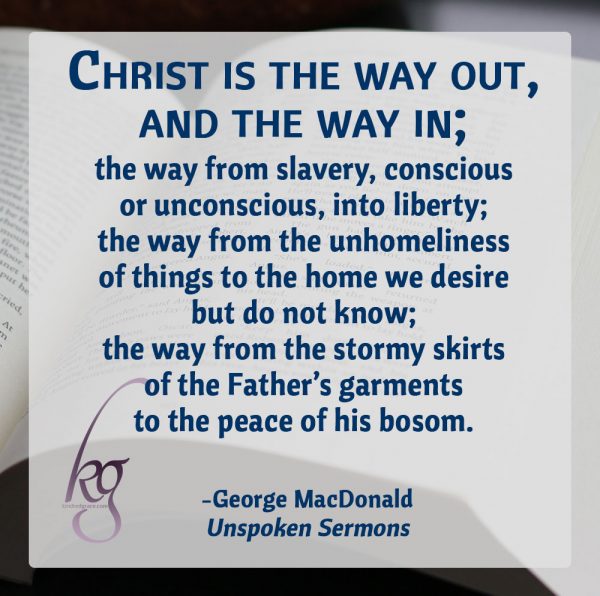


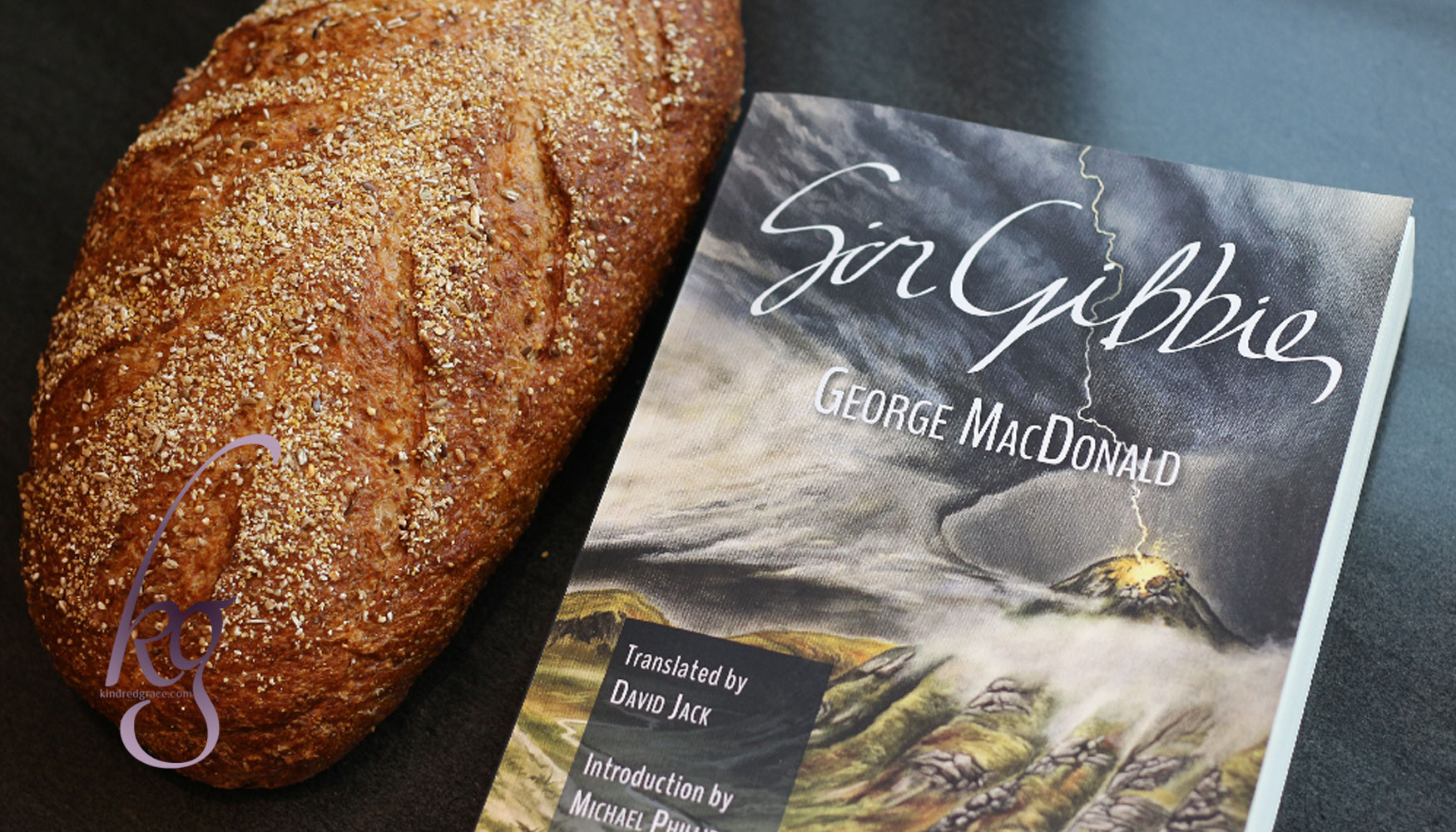
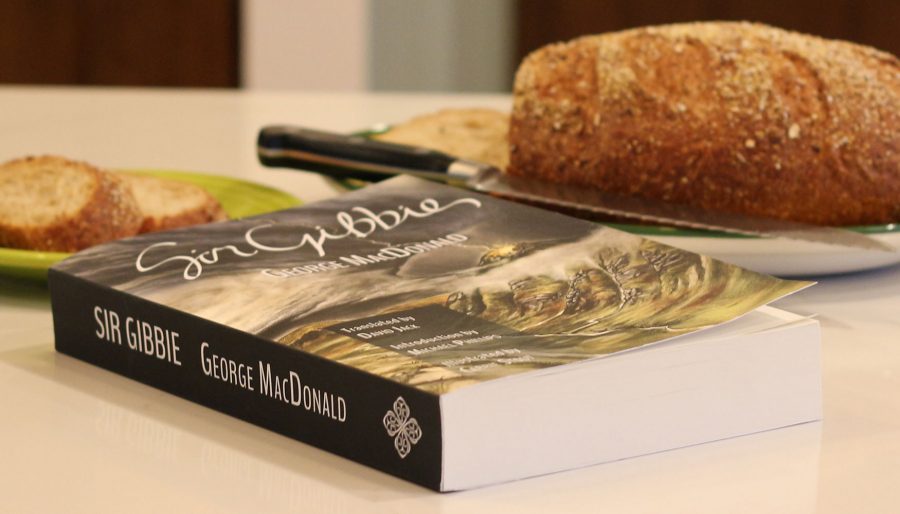
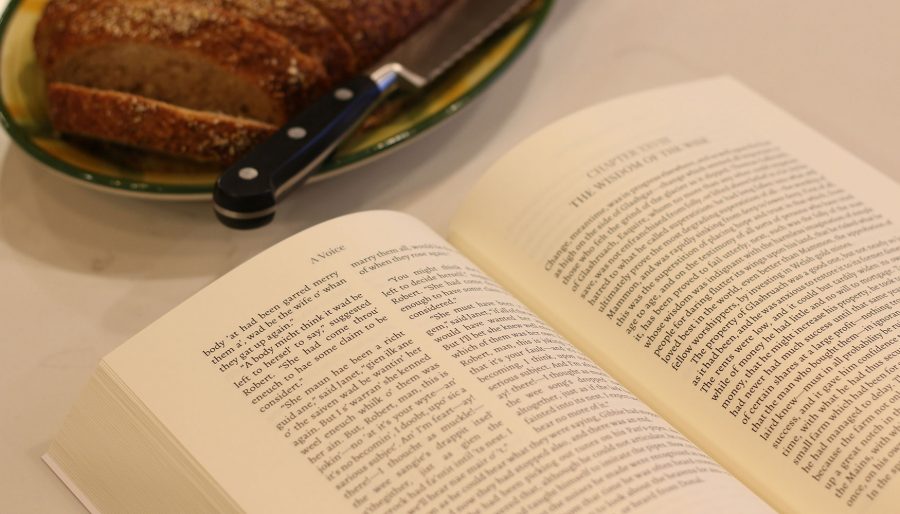
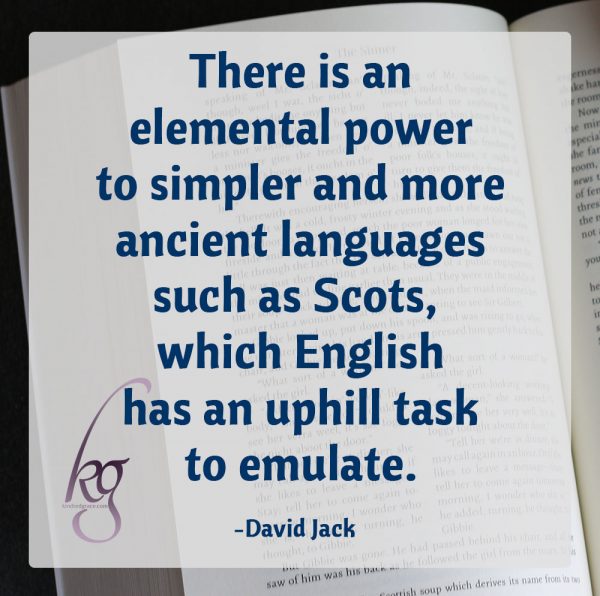
Good point about Keller’s and Laniak’s books.
On re reading my reply to the last question, I realise that “hardcore MacDonald enthusiasts” ordering my MacDonald editions or Michael’s doesn’t in itself mean MORE people being exposed to his work, but if the existing MacDonald fanbase is supporting our work, they will presumably be recommending them to friends, so in a roundabout way, I suppose my answer had a certain logic to it!
I should also mention that there is a Doric New Testament, but ordering it from US amazon appears to be ridiculously expensive, and the generic Scots of William Lorimer’s New Testament translation contains a lot of the vocabulary you’ll find in GM’s novels (plus extras!)
Oh, the Doric and Scots New Testaments sound fascinating! Thank you!